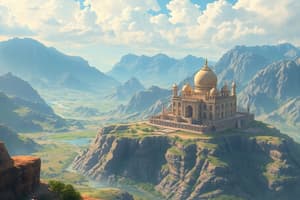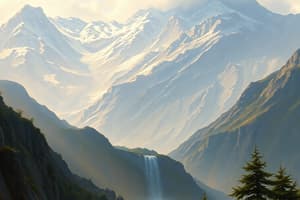Podcast
Questions and Answers
What is a common feature in the hilly regions of India?
What is a common feature in the hilly regions of India?
- Deserts and plateaus
- Rugged terrain with mountains and valleys (correct)
- Vast stretches of plain land
- Islands and plains
Which region of India is geologically considered to be one of the most stable land blocks?
Which region of India is geologically considered to be one of the most stable land blocks?
- Northern Plains
- Himalayas
- Islands
- Peninsular Plateau (correct)
What kind of rocks primarily compose the peninsular plateau of India?
What kind of rocks primarily compose the peninsular plateau of India?
- Volcanic rocks
- Igneous and metamorphic rocks (correct)
- Sedimentary rocks
- Metamorphic rocks
Which landform in India is known for its youthful topography with high peaks and fast-flowing rivers?
Which landform in India is known for its youthful topography with high peaks and fast-flowing rivers?
What type of deposits form the northern plains of India?
What type of deposits form the northern plains of India?
What is the average width of the Great Himalayas range?
What is the average width of the Great Himalayas range?
Which range in the Himalayas is known for its hill stations like Mussoorie and Nainital?
Which range in the Himalayas is known for its hill stations like Mussoorie and Nainital?
What is the altitude range of the Himachal or lesser Himalaya range?
What is the altitude range of the Himachal or lesser Himalaya range?
Which range in the Himalayas lies to the south of the Himadri and is composed of unconsolidated sediments?
Which range in the Himalayas lies to the south of the Himadri and is composed of unconsolidated sediments?
How wide are the Shiwaliks ranges?
How wide are the Shiwaliks ranges?
Flashcards are hidden until you start studying
Study Notes
Hilly Regions of India
- A common feature in the hilly regions of India is youthful topography with high peaks and fast-flowing rivers.
Geologically Stable Land Blocks
- The peninsular plateau of India is geologically considered to be one of the most stable land blocks.
Composition of Peninsular Plateau
- The peninsular plateau of India is primarily composed of ancient crystalline rocks.
Landforms of India
- The Himalayas are known for their youthful topography with high peaks and fast-flowing rivers.
Northern Plains of India
- The northern plains of India are formed by alluvial deposits.
Great Himalayas Range
- The average width of the Great Himalayas range is approximately 400 km.
Hill Stations in the Himalayas
- The Kumaon range in the Himalayas is known for its hill stations like Mussoorie and Nainital.
Himachal or Lesser Himalaya Range
- The altitude range of the Himachal or lesser Himalaya range is between 1,500 to 5,000 meters.
Himalayas Ranges
- The Dhaula Dhar range in the Himalayas lies to the south of the Himadri and is composed of unconsolidated sediments.
Shiwaliks Ranges
- The Shiwaliks ranges are approximately 10-15 km wide.
Studying That Suits You
Use AI to generate personalized quizzes and flashcards to suit your learning preferences.




